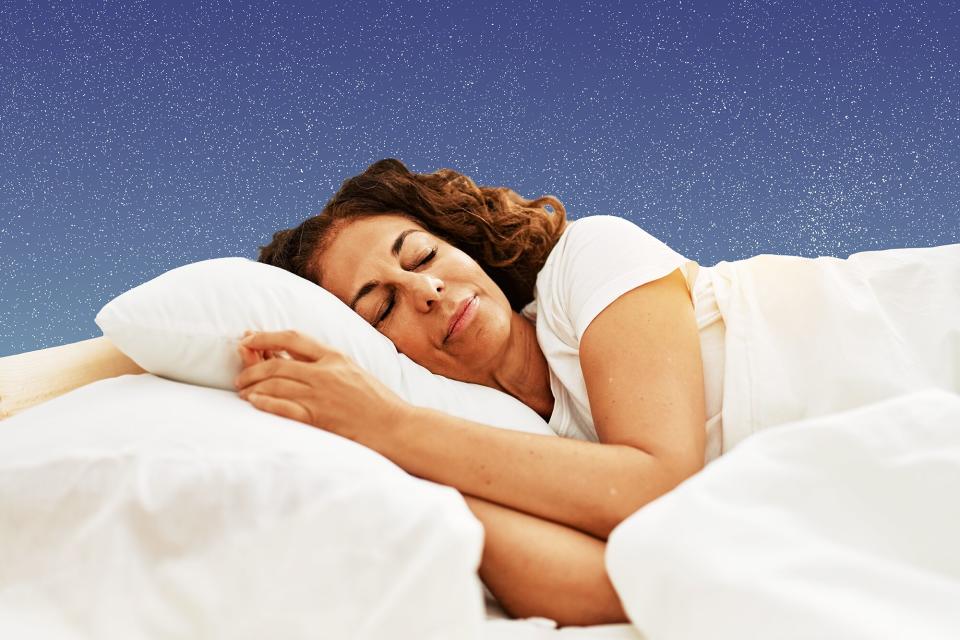Doing This Before Bed Could Lower Your Risk for Heart Disease and Diabetes, New Research Says
Sleep has a major impact on our health. A good night's rest can be a game-changer for weight loss, inflammation and even your immune system. Now new research from Northwestern University indicates that the space in which you sleep could have an effect on your cardiovascular health and insulin resistance.
Related: What Happens to Your Body When You Get a Good Night's Sleep
According to the study published in Proceedings of the National Academy of Sciences, light exposure during sleep could heighten your risk for heart disease, diabetes and metabolic syndrome. Ambient light from parted curtains, open blinds or an overhead light or lamp can activate your autonomic nervous system, which cues your heart to beat faster and make you more alert, even as you sleep.

Adobe Stock / Krakenimages.com
"That's bad," co-lead author Daniela Grimaldi, M.D., Ph.D., explained in a media release. "Usually, your heart rate together with other cardiovascular parameters are lower at night and higher during the day."
The researchers found that when participants were exposed to a lit room, they experienced insulin resistance the next day. Insulin resistance occurs when cells don't respond well to insulin and as a result, those cells can't take in and use glucose for energy as efficiently. Because of this, that excess glucose remains in your bloodstream, causing your blood sugar levels to go up. Having high blood sugar levels overtime can increase your risk for things like cardiovascular disease and diabetes.
Related: Sleep Might Be the Reason You're Not Losing Weight
And while you probably don't leave on all the lights when you sleep, exposure to artificial light at night is pretty common for some folks. If you live in a city, open blinds may bring in ambient light from street lights, car headlights and other sources. And if you fall asleep with your television or bedside lamp on, you could end up feeling those negative effects. Phyllis Zee, M.D. Ph.D., chief of sleep medicine at Northwestern University Feinberg School of Medicine and a Northwestern Medicine physician, shared a few tips for avoiding the negative impact of ambient light in a release from Northwestern.
First, don't leave the lights on while you're sleeping. While a completely dark room might be a safety concern for some folks, you'll be better off using a nightlight or two to make the floor easier to navigate. You'll also want to avoid blue light while sleeping. Warmer colors, like orange, red and amber, will stimulate your brain less. Consider buying warm bulbs for lights that you must have on at night, and if you're using your phone in bed next to a sleeping person, keep that light away from them. (Or try putting your phone far away before bedtime—using your smartphone before you go to sleep can mess with your metabolism, according to research.)
Related: 5 Foods That Could Negatively Impact Your Sleep
If you can't avoid light while you sleep, consider buying a comfortable eye mask that will block out the light for you—it's an affordable solution for those with excess light coming in through windows, though blackout curtains would also do the trick.
"These findings are important particularly for those living in modern societies where exposure to indoor and outdoor nighttime light is increasingly widespread," Zee said in the release. "If you're able to see things really well, it's probably too light."
Bottom Line
For the most restful night's sleep, turn off all lights and close your blinds before bed. If you can't get rid of all the light in your sleeping area, use blackout curtains or a sleeping mask to avoid having too much ambient light in your room as you sleep. Since that light can cause your heart to race and inhibit your insulin regulation, a dark room could help limit your risk of cardiovascular disease and diabetes—and help you sleep more soundly, too.
If you need a little help falling asleep, use this list of sleep-friendly foods as inspiration the next time you need a midnight snack—and be sure to incorporate some of these nutrients for better sleep into your routine.

